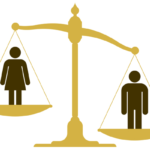As we know, almost half of the Nigerian population are women but we are among the countries that record low participation of women in politics, appointments and government positions.
Since the advent of democracy, Nigeria had only Virginia Ngozi Etiba who became a governor after the impeachment of Governor Peter Obi in Anambra State, from December 2006 to February 2007. Since then, no woman has been elected as governor in any of the 36 states.
- NIGERIA DAILY: Why Epilepsy Is A ‘Disgrace’ To Society
- Nigeria hasn’t properly utilised donor funds – Finance minister
Again, of the 109 senators and 360 representatives, we have less than 30 per cent of women occupying seats in the two chambers.
Despite the constitutional right guaranteed to the women, they are often denied the opportunities because of their gender.
Other factors such as religious and cultural stereotyping have also made their case worse.
In order to end this discrimination, first, we need to accept the equal right and opportunity for women and allow them to participate in politics and other government activities.
Female collaboration will create a balance of power between the genders and will contribute in building strong and vibrant democracy and society.
Their active engagement will also help to solve some of Nigeria’s huge problems like extreme poverty and unemployment. It will lead to inclusive growth, bring attention to issue that affect their gender and change the attribution towards gender.
Sulaiman Lala Department of Mass Communication, Abubakar Tatari Ali Polytechnic Bauchi
 Join Daily Trust WhatsApp Community For Quick Access To News and Happenings Around You.
Join Daily Trust WhatsApp Community For Quick Access To News and Happenings Around You.

